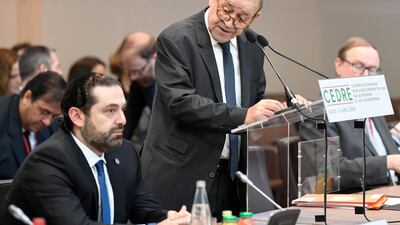Lebanon on Friday won pledges of grants and loans exceeding $10 billion at a Paris conference at which the government sought support for a capital investment programme to boost its economy, Finance Minister Ali Hassan Khalil said.
The pledges included $4 billion in World Bank loans, $1.35 billion in loans from the European Bank for Reconstruction and Development, and the renewal of a previously pledged $1 billion credit line from Saudi Arabia, Lebanese officials said.
Lebanon has been battered by seven years of war in neighbouring Syria, and is hosting more than one million Syrian refugees.
It is seeking the funds for investment to overhaul its infrastructure and to lift economic growth, which Prime Minister Saad Hariri said has sunk to less than 1 per cent from a previous average of 8 per cent.
Lebanon needs international support for its investment plan and to carry out reforms to root out corruption and to improve fiscal governance, among other goals, he told the conference.
"In this effort, Lebanon can not succeed alone. It needs the support of the international community," Mr Hariri said
He called for "a clear and concrete indication of this support in the form of grants and concessional loans".
In a nod to demands for reform, the prime minister pledged fiscal consolidation to reduce the budget deficit - more than 150 per cent of gross domestic product at the end of 2017 - by 5 per cent during the next five years.
_______________
Read more:
Lebanese politicians and experts weigh in on CEDRE conference
Donor conference is a 'Band-Aid' to Lebanon's financial woes
In Lebanon's election, one man's place in parliament is certain
_______________
The Lebanese parliament last week passed a 2018 budget that projects a narrower deficit than in 2017. Standard Chartered, in a research note, called the budget a "positive sign".
The Paris conference, convening 50 countries and organisations, including Saudi Arabia, the United States and Russia, is expected to set up a follow-up mechanism to track progress towards reform.
The International Monetary Fund said in February that Lebanon's fiscal policy needed a consolidation plan that stabilised debt and then began to reduce it.
Diplomats have said Lebanon's success in attracting international support from donors and the private sector will hinge on reforms.
"Lebanon needs significant investments to upgrade its basic infrastructure, which today no longer allows it to provide all these citizens with essential public services in good conditions," French Foreign Minister Jean-Yves Le Drian said.
"On the other hand, Lebanon needs major reforms of its economy, structural and sectoral," he told the conference.
He said France would provide 400 million in concessionary loans and 150 million euros in donations.
Lebanon, which is still rebuilding from its 1975-90 civil war, is seeking investment in roads, power generation and public transport.

